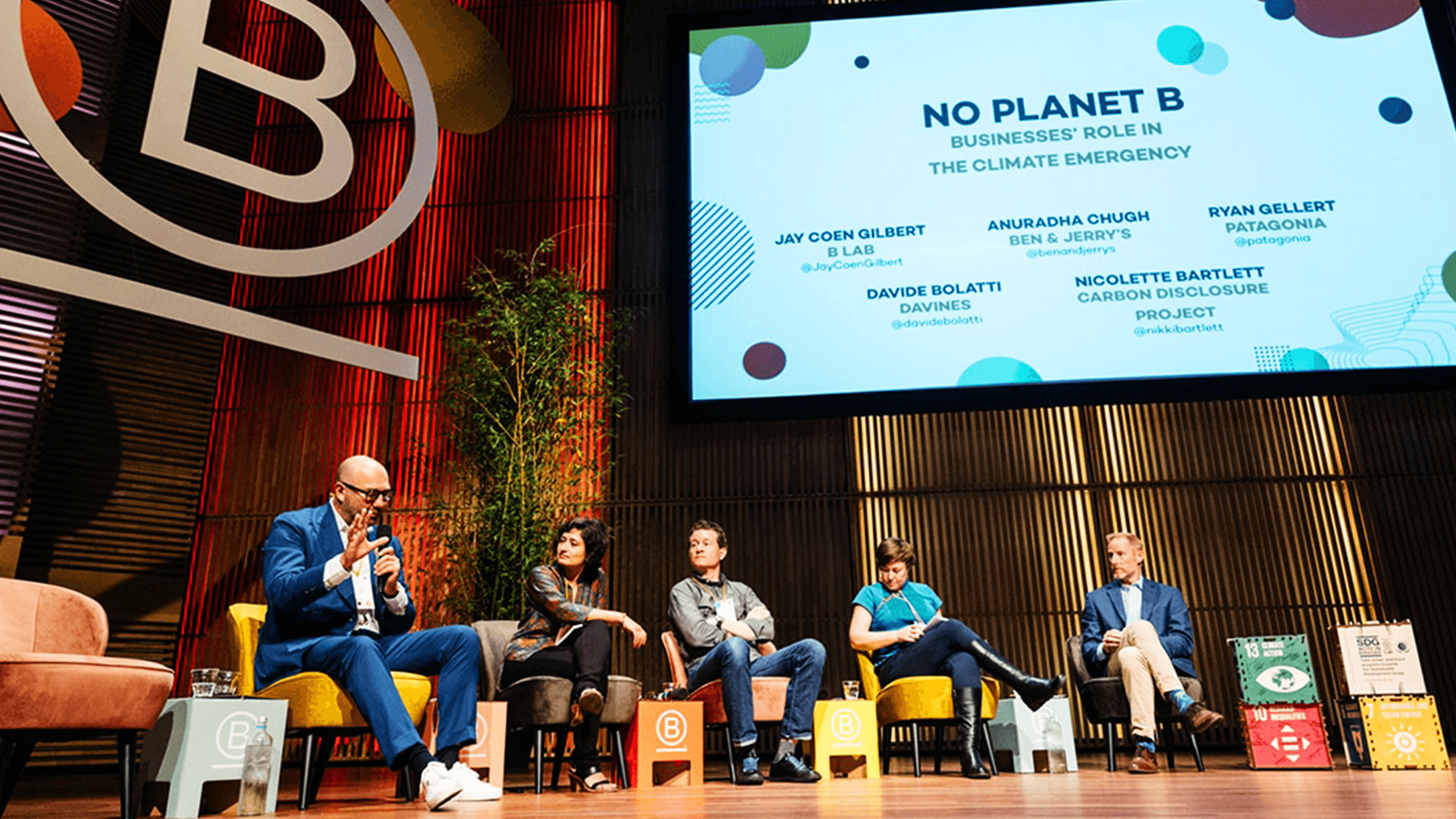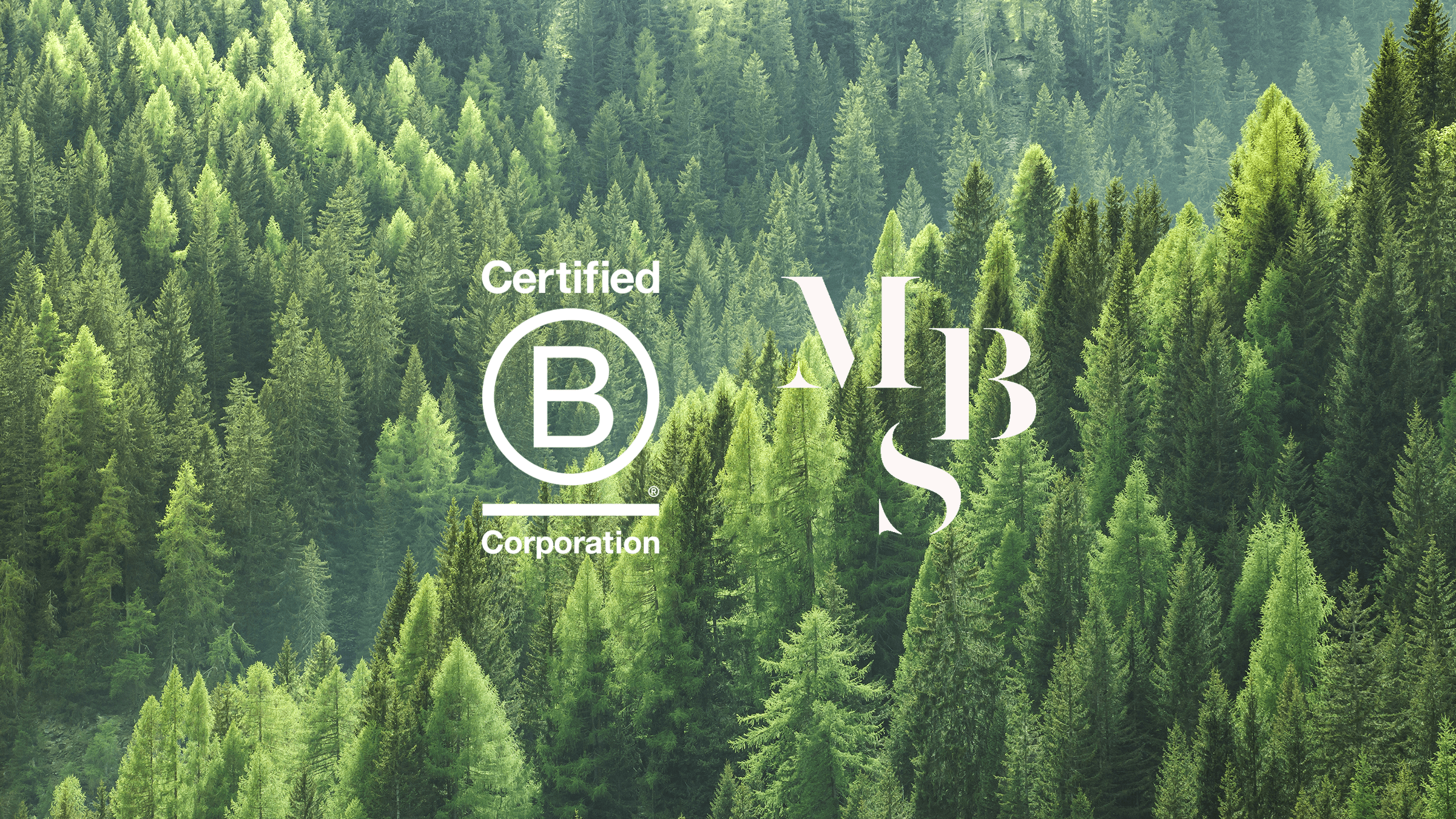For a long while now, MBS has been committed to making our consumer-facing communities a better place. We’re proud of the work we’ve done driving the diversity and inclusion agenda, helping key not-for-profits and trade bodies within our sector achieve success, and supporting charities who need consumer talent to thrive. Over the past few years, we’ve moved to formalise our CSR strategy, and in 2021, made the decision to apply for B Corp accreditation. We’re now proud to announce that MBS is a certified B Corporation.
Over the last month, we’ve been reflecting on what B Corp means – not just for us, but for the dozens of businesses in our consumer-facing sectors which have made the commitment to transparency, accountability and continuous improvement. Catching up with chief executives, chief sustainability officers and other senior executives from B Corp consumer businesses, it’s been fascinating to hear about the journeys that different organisations have been on, and inspiring to feel the deep sense of responsibility held by purpose-driven companies.
Perhaps most significantly, every leader we spoke to was clear that B Corp is just one piece of a much larger puzzle. “Gaining certification is not about the individual businesses,” said Mark Cuddigan, CEO at Ella’s Kitchen. “It’s about great leaders standing up and saying: this matters. CEOs are no longer just responsible for the companies they run, and B Corp requires leaders to recognise and prove this.”

For most B Corp companies, gaining certification means formalising existing frameworks, rather than starting from scratch on topics like diversity and sustainability. “We certified in 2019,” said Stendert Krommendam, Chief People and Sustainability Officer at Ecotone, which owns the Clipper Tea, Kallo, and Whole Earth brands, “and for us it was mainly a process of standardisation. For example, D&I was very important to us culturally, but we didn’t have a truly formalized approached in place back then. As a result of the initial B Corp audit back in 2019, we put a much more structured plan together with two separate pillars – gender and young people with a distance to the labor market – and now in each region we have all teams mobilised around that topic, both on internal and external activities and partnerships. That is the beauty of B Corp, it helps you to intrinsically improve your practices.”
“We started the journey in 2015, and it took us three years,” said James Thornton, CEO at Intrepid Travel. “The process really shone a light on what we did well, and also what we could improve on. We took big steps on governance, and now we’re ranked in the top ten percent on corporate governance in the global B Corp community.”
Once certified, B Corp is an invaluable tool to measure impact and create accountability. “It keeps you honest,” said Ted Bell, CEO at Freddie’s Flowers. “Businesses are trading in a very tight cost environment at the moment, and it would be easy to cut corners. With B Corp, cutting corners isn’t an option, and we’re constantly challenged to do better.”
“Businesses are trading in a very tight cost environment at the moment, and it would be easy to cut corners. With B Corp, cutting corners isn’t an option, and we’re constantly challenged to do better.” – Ted Bell, CEO, Freddie’s Flowers.
Continuous improvement is integral to becoming a B Corp. Fashion retailer FatFace gained certification in April, and now the business is looking to widen its impact: “the assessment process is excellent for showcasing where you’re strong, and where there’s room for improvement,” said Trading and Sustainability Director Nick Stevenson. “We actually scored well across all metrics, which kickstarted a conversation internally about what we stand for, and whether we should focus our efforts on one or two key areas to make the most impact. Our next chapter is applying what we’ve done at FatFace to our supply chain, as that’s where we can make the biggest difference.”
It was interesting to hear viewpoints on the commercial benefits of B Corp. We know that today’s consumers are factoring sustainability and fair treatment of workers into their purchasing decisions – so certification can be a valuable marketing tool. Indeed, research from B Lab (the non-profit behind the certification) found that while 80% of people in the UK favour shopping from companies that are doing good, only 22% find it easy to identify whether a brand means what it says.
Certification provides access to a global community of likeminded businesses. For many leaders, being part of this network is an invaluable benefit: “forming relationships with our peer group has been a really interesting development,” said one senior leader at a restaurant business, “It’s been fantastic to meet hospitality executives, investors, and other B Corp leaders to share resources, swap insight and learn from each other.”
However, every leader we spoke with was firm that achieving B Corp was not about the customer. “We don’t see it as a marketing tool,” said Ted Bell, “While the badge might put people at ease, it’s not engaging. If you want to take customers on a journey, tell them a specific story. So at Freddie’s we collect rain water from our roof to clean our electric vans. All our bikes are electric. Those are the stories that stick – not a logo on our website.”
Ben Black, executive director at Verlinvest – which backs purpose-led brands such as Oatly, Tony’s Chocolonely and Vita Coco – echoed this view. “As an investment philosophy, we are of course positive about B Corp,” he reflected. “Customers are willing to pay more for brands that are doing good, and certification is the best way to validate positive impact. But B Corp isn’t substitute for clear front-line communication with the consumer, or for a good product. Take Tony’s, for example: the message there is slave-free chocolate, not B Corp chocolate.”

While it’s difficult to pinpoint the impact of becoming a B Corp on metrics like sales, its influence on talent strategies is unquestionable. “I’m yet to be convinced that B Corp drives sales, but we attract better talent with B Corp,” reflected James Thornton. “Through surveys we know that B Corp is one of the key reasons why people join our business, and it’s also why they stay.”
Mark Cuddigan gave a similar view: “It’s huge for employer brand. Of the last ten interviews I’ve done, every candidate raised B Corp. People want to work for a purpose-driven organisation, especially the younger generation.”
As more and more companies become B Corps, it will be interesting to see how selection and assessment processes change for the most senior strategic roles. Within the consumer sector, for example, only a small minority of organisations today are scrutinising leaders on their approach to CSR outside of specific functional roles.
“I’m curious in how the assessment of future (B Corp) leaders will evolve,” reflected Stendert Krommendam when we discussed this last week. “To date, assessment on the identification of game-changing sustainability leaders is still in its infancy. The great B Corp leaders are those who are prepared to make major interventions within an industry or organisation, who are bold enough to reject the status quo around how things are done. It will be critical that across industries we will discuss, develop and evolve our selection and assessment approach – not just in sustainability or CSR roles, it will be key to have the sustainability DNA fully integrated in all roles across your organisation.”
Certification provides access to a global community of likeminded businesses. For many leaders, being part of this network is an invaluable benefit: “forming relationships with our peer group has been a really interesting development,” said Eleanor Besley Gould. “It’s been fantastic to meet hospitality executives, investors, and other B Corp leaders to share resources, swap insight and learn from each other.”
“Gaining certification is a serious responsibility. Not only is it a rigorous, time-consuming and costly process, but a commitment to fundamentally changing the way we think about business.”
Gaining certification is a serious responsibility. Not only is it a rigorous, time-consuming and costly process, but a commitment to fundamentally changing the way we think about business. As James Thornton articulated: “At Intrepid, profit is one output – not our reason for being.”
For CEOs thinking about starting the journey, the first port of call is thinking carefully about why B Corp is important to the business. “Make sure you’re approaching B Corp in the right spirit,” said Mark Cuddigan, “don’t go into it with false pretenses.” It is far from a tick-the-box exercise.
We’re very proud to have joined the B Corp community at MBS. We’re committed to continuous improvement internally, and to supporting businesses in our consumer-facing sectors as they become more purpose-driven and impactful. This is a constantly evolving conversation – if you’ve gained certification, or are considering starting the journey, we’d love to hear from you.








